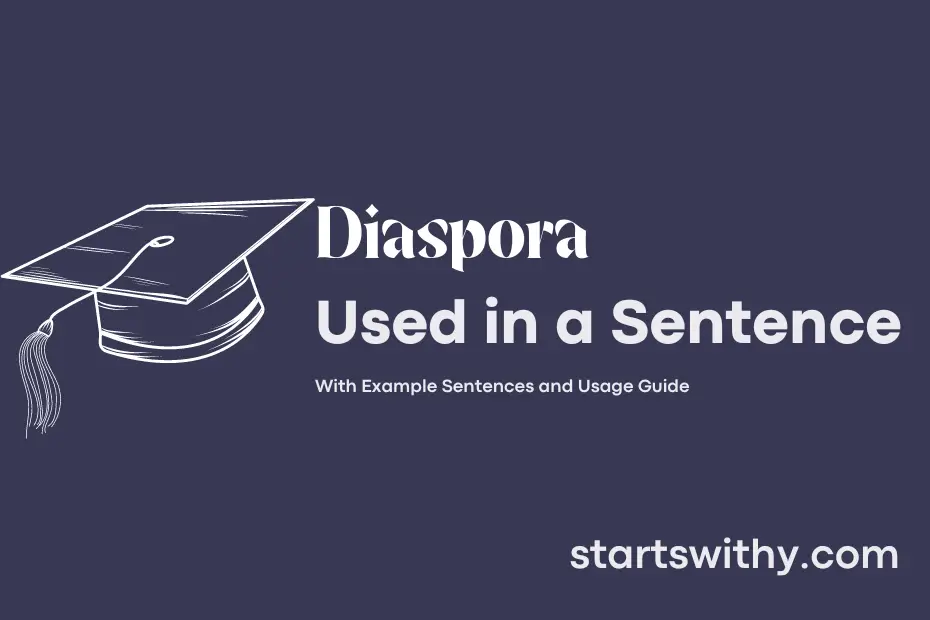Have you ever heard of the term “diaspora”? Diaspora refers to a scattered population with a common origin that resides in different parts of the world, often due to forced migration, historical events, or economic reasons.
This term encompasses diverse communities bound by their shared heritage and experiences, maintaining connections with their homeland while adapting to new cultures in their adopted countries. Throughout history, diasporas have thrived, preserving their traditions, language, and identity, making invaluable contributions to the global landscape.
7 Examples Of Diaspora Used In a Sentence For Kids
- Diaspora means people moving to live in different countries.
- My friend’s family is part of the diaspora.
- Let’s learn about the Indian diaspora.
- We can celebrate the diaspora culture.
- Many Indians are in the diaspora.
- The diaspora community is diverse.
- We can make friends in the diaspora.
14 Sentences with Diaspora Examples
- Diaspora can provide a unique perspective on global issues in college discussions.
- Students studying abroad often find comfort in connecting with the local diaspora community.
- The Indian diaspora plays a significant role in promoting cultural exchanges and fostering understanding among students.
- Social events organized by the diaspora offer college students a chance to network and make connections.
- Discussing the challenges faced by the diaspora can spark meaningful conversations in multicultural college settings.
- Many college students benefit from the mentorship and support provided by the diaspora.
- Exploring the history and contributions of the Indian diaspora can enrich students’ understanding of global migration.
- Diaspora organizations often offer scholarships and internships to support college students in pursuing their academic goals.
- Attending cultural festivals hosted by the diaspora can be a fun way for students to learn about different traditions.
- College students may find inspiration from successful members of the Indian diaspora who have excelled in their fields.
- Language classes offered by the diaspora can be a valuable resource for students looking to improve their skills.
- The diverse perspectives within the diaspora community can challenge students to think critically about identity and belonging.
- Volunteering with diaspora organizations can provide students with hands-on experience in advocacy and community building.
- College students can learn about the customs and beliefs of different regions through interactions with the Indian diaspora.
How To Use Diaspora in Sentences?
Diaspora is a decentralized social networking platform that allows users to connect with others while retaining control over their data. To use Diaspora, start by creating an account on one of the available pods, which are independent servers that make up the network. Once your account is set up, you can customize your profile, including adding a bio, profile picture, and interests.
To connect with others on Diaspora, you can search for people or join various communities based on your interests. You can share posts, photos, and links with your connections or publicly on the platform. It’s important to respect others’ privacy settings and only engage with content that aligns with the community guidelines.
Using hashtags in your posts can help others discover your content, while liking and commenting on posts can help you engage with other users. You also have the option to send private messages to individuals or create group conversations.
Overall, Diaspora offers a user-friendly interface for social networking in a more private and secure environment compared to traditional social media platforms. By following the community guidelines and respecting others’ boundaries, you can make meaningful connections and share content that resonates with you.
Conclusion
In conclusion, the term “diaspora” refers to a dispersed group of people who share a common identity, culture, or heritage, often living outside their original homeland. Examples of diasporas include the Jewish diaspora, African diaspora, and Indian diaspora, each exhibiting unique characteristics and histories. Throughout history, diasporas have played significant roles in shaping cultural exchange, economic networks, and political movements across the globe.
The concept of diaspora continues to be relevant in contemporary society, with diasporic communities maintaining connections to their homelands while also contributing to the diversity and richness of their adopted countries. Recognizing and understanding the experiences of diasporic populations can offer valuable insights into global migration, transnational identities, and the complexities of belonging in an increasingly interconnected world.



